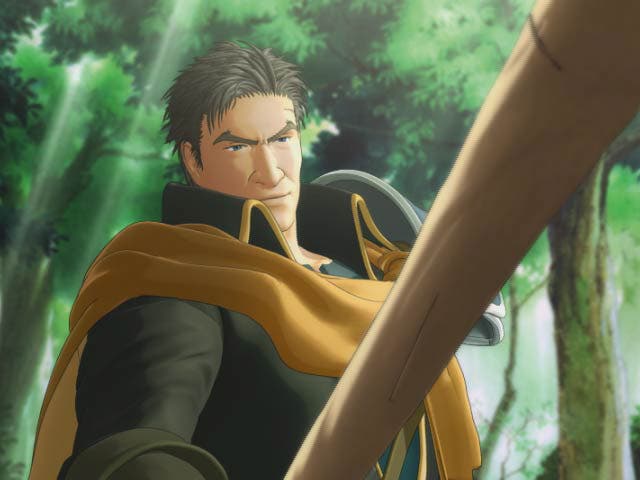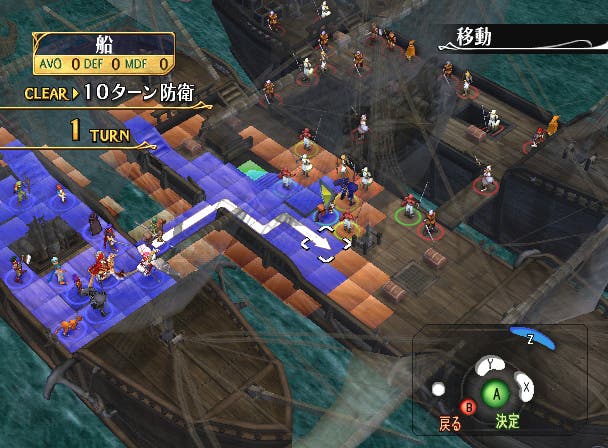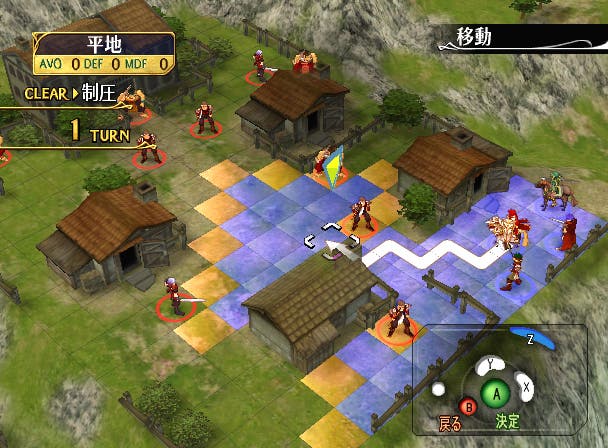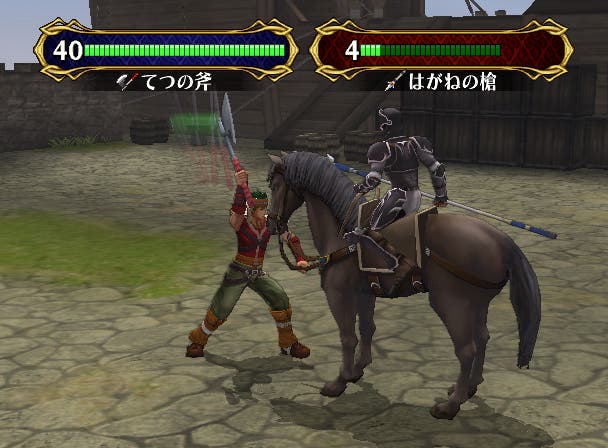Fire Emblem: Path of Radiance
Flame war.
Right, let's kick off with some controversy: Fire Emblem's deeply flawed.
Almost everyone loves it at first. Gaily I joined a mercenaric band of adventuring ruffians, and our treks cross-continent gave us time to bond - whether for their moralism, combat skill or some other idiosyncratic charm (like a brilliant hat) - and become equally enamoured with the game's turn-based war-doing; its paper-scissors-stone weapons triangle system; the character progression; the recruitment of wayward souls; and that warming musical accompaniment, twisting your lips into a whistle every time you give up playing for five minutes to go to the loo.
All this stuff's true of all three I've played, but to lessening degrees. With the first GBA Fire Emblem, I felt that way for so long that those are my defining memories.
The second on GBA, Sacred Stones, lost some of its attachment. The all-round charm was still there, but there was something else. That it was largely the same thing accentuated everything. Waiting for things to happen. The burden rather than the excitement of micro-management. The frustration of being ambushed late in the level by enemy reinforcements. The compounding agony of losing cherished characters to the game's permanent-unit-death, knowing they wouldn't return.
For all its pseudo-3d terrain and polygon graphics, Fire Emblem: Path of Radiance would work just as well on GBA - a criticism in itself - and lives or dies on its characters and your attachment to them, or the strength of your interest in total victory.

Combining turn-based strategy and Japanese role-playing game-style narrative still works well for it. Even slightly suspicious Fire Emblem veterans, alert to its quirks, will be blinded by the opening cel-shaded cut-scene that introduces us to main character Ike, and the surface features and balances are quick to impress the uninitiated. Couched in heart-warming, extremely text-heavy dialogue exchanges to draw the plot along and the far-too-occasional resort to cut-scenery, the missions involve routing enemies, reaching an escape-route intact, defending areas, doing things in limited turns, and so on, and the rules that govern all this and the set-up of your party are easily understood and all-too-easily admired.
The weapon triangle, for example, says that units with axes will do more damage against those with lances, while lances best swords, and swords axes. Given that your merry band of adventurers is diverse both in skills (there are melee fighters, ranged fighters, aerial units, mounted riders who can be either melee or ranged, magic units both offensive and defensive, specialists like thieves, and others) and in their initial levels of experience, it's a lot more engaging than commanding an army.
You initially inherit a few solid, brute-like allies who can be used to steamroller enemy troops and blockade the path to your more vulnerable units without receiving too much damage, and your determination of how to position each unit in each turn therefore involves measuring lots of likelihoods. The likelihood of their being attacked (examining nearby enemies' attack-ranges), for example, their need for supplies, the benefits of attacking first (often landing two blows, perhaps eliminating an enemy in the process), whether they can move again after attacking, who in the group needs defending, whether they need healing first and if you can afford to move your extremely vulnerable healer to within one space of that unit where it could come under fire from a ranged enemy, whether there's a house nearby that you could visit for a free item, whether this sentence will ever end... What Fire Emblem seems to get so much more right than most turn-based strategy games is teaching you all this stuff in a way that doesn't frustrate and confuse (like this paragraph did).

Adding to that are the addition of new units in Path of Radiance, the Laguz - a race of half-animal humanoids who spend some of their time in ultra-powerful animal attack mode (huge movement range, vicious attacks, hard to hit) and some of their time in humanoid mode (hugely vulnerable, waiting for their animal-meter to recharge) - and the series-constants of varying map conditions, and the need to carefully plan your manoeuvres so that nobody dies (which carries over) and equally so that none of the named characters in the enemy ranks who might become targets for recruitment (typically exposed in-game by dialogue-exchanges revealing their troubled thoughts) are harmed either. There's lots and lots to consider.
Where many turn-based strategy games are about fashioning an attack strategy that doesn't sacrifice too many units or use up your best tricks too quickly, Fire Emblem is a lot more to do with defensive manoeuvring. You really have to manage yourself on the grid-based terrain - clogging chokepoints with resilient hard-men (and women, like the blessed Titania - they really feel like individuals and you'll remember them by name) to protect more vulnerable ranged, flighted, or benevolent units; using tougher mounted units to reach far-flung sub-objectives; getting Ike, the only unit whose death ends the game completely, face to face with potential recruits; and making sure that whatever happens in the enemy's turn isn't going to ruin you.
Compared to something from Nippon Ichi or even Final Fantasy Tactics, it's rather single-minded. There are generally only one or two approaches you can reliably take without risking too much, and they involve similar tactics, like plonking a second unit behind the main blockade to distract ranged enemies, for instance. What with all the personality, the character development and levelling up - particularly when units reach level 10 and you can use any Master Seals you've gathered to push them into a new, stronger character class - it's a very paternal kind of responsibility that you feel. Letting one of your party die because you really don't want to replay the last half hour again will weigh heavily upon you - upon any gamer with a big heart (and if you're heartless, well, you might as well give up - I've already tried to weed you out a couple of times with the stuff about heart-warming storylines and whistling. Bog off).

You can see why it hasn't changed. It's set up just so. There are minor concessions - you can now add "shove" to "rescue" in the 'list of abilities that can be used to narrowly avoid perma-death', as it allows you to push one of your allies into an adjacent square, potentially moving them out of range of an enemy if you've been foolish enough to leave them there. But for a couple of other supplementary features like Skills, which are like wildcards that you can equip to favoured folk, it's barely a departure at all. Even the story is familiar - an unprovoked conflict, those caught in the middle of it, loss of those dear to you, big secrets and turncoats, big-hearted allies and panto-evil enemies. And many of the unit types and individual weapons are the same or very similar.
You can also see why it tortures me so.
It's not the things that are just dodgy about it. Yes, it's silly having to wait for all the animated battles to take place when half the time you can establish the outcome by reading the stats. Yes, it's a bit tedious having to move everyone individually, and then waiting for the enemy to move all its surplus bits around. Yes, some of the missions border on passive - in one defend scenario, I blocked three entrances, then had to sit and wait five minutes until it was time to do some healing. Over and over. Yes, some of the characters you recruit are so weak that you'll barely use them, and many of your initial resets will simply be about deselecting them from the party. Yes, the new "direct" command for partner-units simply exposes their oft-awful AI, and they join the ranks of people-to-keep-out-of-the-way.
But it's not that. It's the inherent stuff. The way the game seems to laugh at you when you use an offensively brilliant unit to block a chokepoint - someone skilful enough to take a hit then kill an enemy with his reaction, freeing up the adjacent square each time so that another enemy can move in and have a pop, in the process bleeding health enemy-by-defeated-enemy until he dies by virtue of actually being too good. It wants too much forethought. Not only do you want to keep your vulnerable-if-he-kills-the-first-three-guys unit just out of range, but you also want to keep him out of the recruitable young wyvern-rider's range too or she'll impale herself on a lance and ruin any chance you had of getting her involved later. Too often you're relying on the AI not to seize the opportunity.

Unless you're prepared to let them die, and you won't want to, the only answer to a permanent character death is a reset. It says something that one of my most excited moments, slumped on the couch at 2am preparing to start again, was a text message from a friend revealing that you can reset the game by pressing three buttons at the same time.
But, it also says something that I did reset. Not dutifully, not reluctantly, but with renewed zeal, with a determination not to screw it up that way twice.
What I do in Fire Emblem is try and defeat the scenario with no losses, and with maximum gains. Yes, it's hard. Yes, you can let people die and continue. But I only ever do that with a very heavy heart. It's like trying to get a perfect lap in a racing game, but screwing up a different corner each time - you know you can do it, and you won't give up until you do because you want to see the next track. Or, in Fire Emblem's case, where the story's going. Where you're going. Who that bloke actually was. You want to keep going. The game wants you too as well - it rewards perfection with bonuses.
There are moments of triumphant delirium in amongst this too. When the game sides with you - when you've worked out your character might die this turn when the third enemy gets to him, and instead of receiving a mortal blow your man pulls out his weapon, spins it in some elaborate once-in-a-blue-moon special-circumstances animation, and lands a single-blow-kill with a satisfying CRUNCH.
But then, there'll be those to whom it feels like a racing game with just one car. Those who don't see the reliance on the strongest units as a charming reflection of the family feel of your group, but something that totally undermines any sense of strategy at all. Those to whom variety of strategy isn't just a fun extra, it's the whole game. Fire Emblem, they'll say, isn't about freedom of strategic expression at all. It starts off brilliant, then erodes your enthusiasm over time. They're not wrong - the key is that it divides people into those who just wanted to strategise, and those who accept the restrictions and love struggling to get everyone through, and love the way the game makes you care enough that you'll want to.
So yes, when you boil it down to that, it is deeply flawed. So you'll sigh. And then, if you're in my group, you'll restart the chapter and try it again. We're not wrong either.

